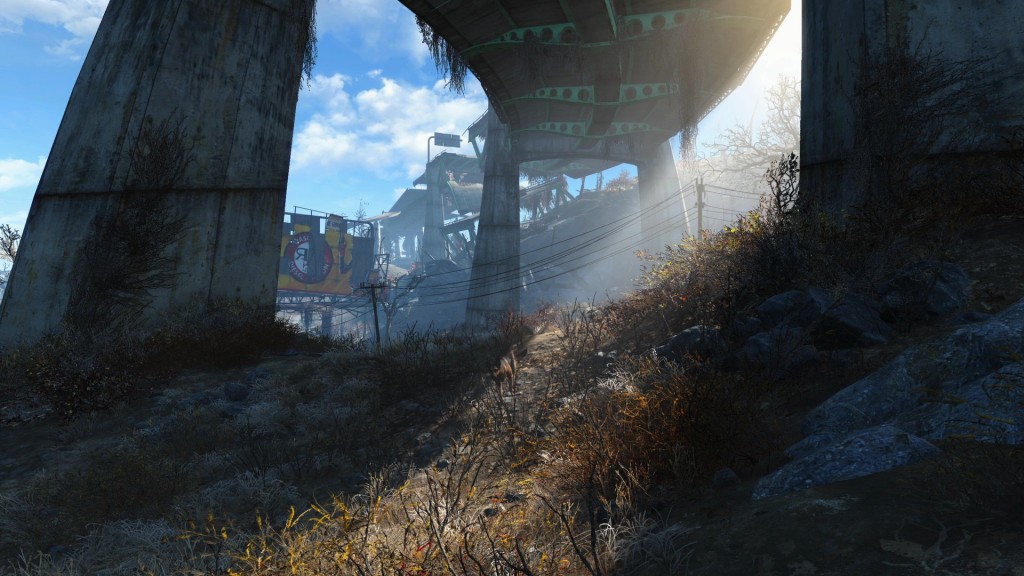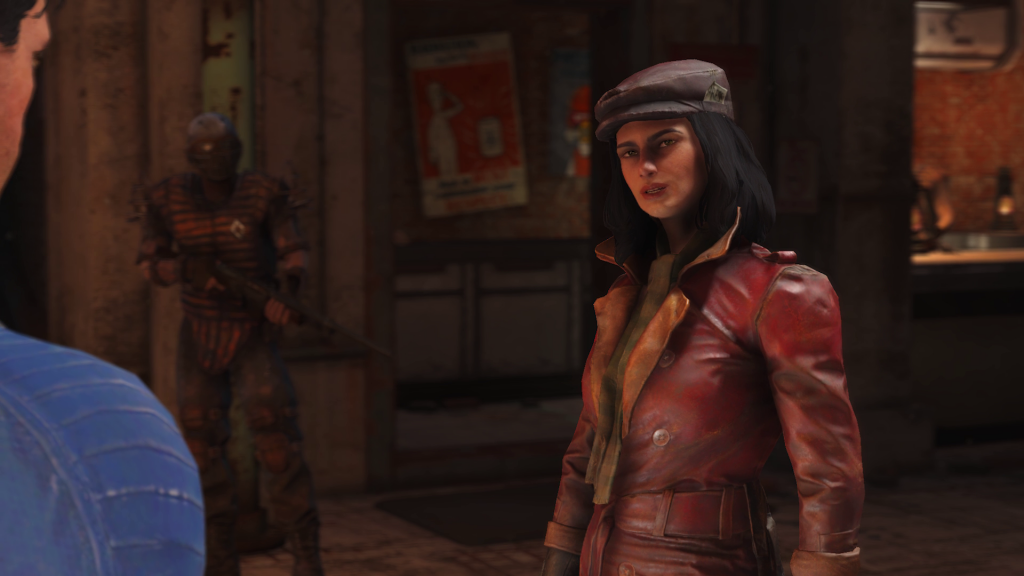A disaster completely destroys your city or country, what do you do?
Thankfully, numerous videogames have prepared everyone for such a scenario. You immediately go on a killing spree as you look for The Thing that will improve your life, of course. Following 2013’s The Last of Us, you might bring a critical survivor to an important location, shooting mutated humans in your way, scrapping for supplies. Or you could seek vehicular vengeance a la Mad Max (2015). Alternatively, perhaps you need to look for your father, barreling across a hazardous wasteland, helping to purify water when you’re not firing slugs into molerats—yep, that one’s Fallout 3 (2008).
What do you do after you find The Thing? Well you take the points or upgrades or materials you’ve acquired from shooting and running over things, and use them to get better at shooting and running over things.

These games always answer the question of what to do on an individual level, but rarely do they address it on a societal level. They’re pure, indulgent, aggressive macho fantasies. The world will not be stable if we all follow their example: everyone running around and shooting people for spare parts, trying to find a lost paternal figure. There’s a bigger question that these games have ignored for the sake of their power fantasy. What is a society supposed to do when a nuclear weapon or zombie outbreak or global warming has destroyed everything? Beyond that, what constitutes a society in such a state?
These are questions that last year’s Fallout 4 has started to explore. It believes the answer lies in interior decorating, borrowing from a thread of game design typically categorized as “girl games.”
If you haven’t peered over the gender divide of games recently, girls are being tasked with finding joy in domestic labor and maintaining strange beauty rituals in “girl games.” These games share themes of dressing up, cooking, caring for children and pets, and decorating a home. In sharp contrast to the violent and self-interested masculine themes of many post-apocalyptic games, these games groom girls to think about other people, even though videogames are commonly hoisted as a place for a solipsistic form of imagination. Novelist and literary critic Margaret Atwood’s wisdom applies here: “Even pretending you aren’t catering to male fantasies is a fantasy … You are a woman with a man inside watching a woman. You are your own voyeur.” Whether it’s helping a princess apply layers of green goop to make her aesthetically appealing to her prince (Princess Jasmine Birthday Party Prep), cooking with a baby (Baby Hazel Cooking Time), or decorating a house (Dollhouse), you are a girl watching yourself play male-defined roles of womanhood.
Because games are so heavily gendered in what is seen as appropriate or natural forms of play for boys and girls, they end up being unhealthy caricatures. Whereas many post-apocalyptic spaces seem to punish players for being empathetic or nonviolent with a quick death, many “girl game” experiences punish you for not constantly seeking approval through appearance, interior decorating, domestic labor, and mothering skills. One is deeply self-interested; the other is a form of shallow martyrdom.
There are meaningless and limiting parts of “girl games”: the emphasis only on others, the importance of looking attractive to men, the supposed joy of vacuuming. Thankfully, Fallout 4 discards these as it tries to strike a balance between individual fulfillment and altruism. When you are asked to build a settlement in Fallout 4, you can see a little “happiness” meter. After placing your first rug, or framed picture, or jukebox, this meter increases. Slightly. It’s a little clumsy, and very game-like to assign a number to happiness, but the idea it’s communicating is powerful: these small indulgences, these acts of adornment are what make a community. These settlement-building systems only make sense in the context of a violent world; on their own they are empty gestures.

You are of course free to ignore some of these features. You can go through the game and not really decorate or clean up even one of your settlements, in the same way that you can choose to not play with a helpful follower. But it becomes a deeply isolating and selfish exercise to pick up materials to only use for guns and armor upgrades, or to make more drugs to inject. It can make you feel like an unpleasant vulture. You know what feels great? Building a market stall and having characters walk around it. Making a beautiful chair and seeing a settler sit down in it, with “The Swan” playing over the radio that you gathered parts to build. It’s rewarding, welcoming to return to your settlement after a battle with yet another band of raiders, with the generators humming, cooking a deathclaw steak as a settler farms in the background.
And the game’s systems offer answers to the question “what makes society” over and over. Fallout 4 encourages you, while wandering through abandoned buildings, to take look at the irradiated trash that used to be a home in a different light than its predecessors. The series has always made it clear that searching through rubble can reward you with better guns and armor, but now it’s also a way to build and improve a settlement and its community. A desk fan is an opportunity to use the gears to make a water pump. The circuitry from the telephone next to it can be used to make a turret to protect the town and the people you’ve brought to it. You also discover that, as you spend more time with your followers, they will slowly open up to you if they witness actions they agree with, and you begin to learn about their drug addiction or their struggle to overcome their past. This iterates the idea that your story is not the only story to experience. In fact, one conversation with your robotic butler and housekeeper Codsworth alludes to the importance of keeping company throughout the game. You emerge after 200 years of being frozen in a vault, and upon reuniting with your old friend Codsworth, he talks about his loneliness: “Two centuries with no one to talk to, no one to serve. I spent the first ten years trying to keep the floors waxed, but nothing gets nuclear fallout from vinyl wood. Nothing! And don’t get me started on the futility of dusting a collapsed house.”
The Fallout series has always featured places where you could see other people buying and selling items or living in hotels, and sometimes you could have a small home of your own. But you were always a wanderer, and you could only ‘help’ others by going out and killing or retrieving something they required. Now, you actually get to build that town. You can explore the wastes, gather up everything that has been destroyed, and use it to improve the lives of other people. It’s drawn out the deeper meaning of those home decoration and cooking games by putting them in the context of these violent and unstable worlds. It turns these “girl games” into acts of defiance against raiders and enemies who try to hurt your settlers and upset the community you’ve created.
Other games are enabling these behaviors too, and their players are embracing the change. Look to the Dark Souls (2011) and Bloodborne (2015) communities, which love to defy what makes for good defensive armor by engaging in what has been deemed “Fashion Souls”; piecing together outfits based on aesthetic or cosplay goals rather than chasing increased protection against attacks. Last year’s Undertale also enjoyed upending the whole notion of violence. Maybe, it suggests, that monster you’re fighting can be overcome by showing it love and by not bullying it into submission, or to death. In Brothers: A Tale of Two Sons (2013) and Fable 2 (2008), sometimes the quiet moments spent with your companion say more about time well spent than resolving the fate of the world. Whether it’s being silly with your appearance for the entertainment of a community, viewing empathy and kindness as signs of strength, or giving time to treasuring moments of connection, these features borrowed from “girl games” can prove more fulfilling, more meaningful than bludgeoning a person’s face.
The pink shanty town built for girls is cramped and vapid. The grimy, slaughter-happy wasteland reserved for boys is bleak and tiresome. After years of videogames encouraging players to run riot in the latter, perhaps they’re steadily realizing that a dilapidated settlement covered in strings of lights and a frilly rug is a welcome sight.
Featured image via khreesy
